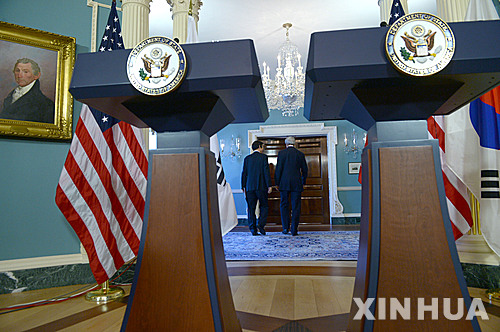Next US president and N. Korea
Tong Kim – The Korea Times
South Korea and the United States have failed miserably to stop North Korea from developing a nuclear weapon and the delivery system for it, particularly during the past seven years and eight months under the Barack Obama presidency and the two conservative South Korean presidents ― Lee Myung-bak and Park Geun-hye.
Seoul and Washington are trying to “enhance and expand U.N. sanctions” against the North in the wake of Pyongyang’s fifth nuclear test of Sept. 8, which was assessed to be the strongest so far. Focusing on sanctions, it is highly unlikely that there would be any chance for dialogue with the North, either for containment or dismantlement of the North Korean nuclear arsenal during the remainder of Obama’s term in office.
The Seoul government, since before the fifth nuclear test, has excluded the term dialogue in its vocabulary on North Korea, focusing on sanctions and retaliation against continuing provocations that would lead to “self-destruction.” Seoul’s prime minister told the National Assembly last week that it was not the time for dialogue but for sanctions and pressure. A few days later, President Park ruled out any possibility for Pyongyang’s return to dialogue.
The U.S. administration still keeps the door open to “a credible and authentic talk,” meaning if the North is serious and shows credible evidence that it is committed to denuclearization and if it is ready to discuss the authentic subject of denuclearization, the United States will then meet the North Koreans.
By talking the talk, Washington maintains the semblance of a long-held three-pronged policy of deterrence, sanctions and conditional dialogue. While Washington says whether or not it will engage in dialogue still depends on changes in North Korean behavior, few senior officials in Washington or Seoul believe that the North will change. In short, the prospect for dialogue is slim before Obama leaves office.
On Sept. 18, the foreign ministers of Seoul, Washington and Tokyo met in New York to discuss tougher implementation of the existing sanctions and adding new measures “to restrict further revenue sources for the North Korean nuclear and missile programs,” on the sidelines of the 71st U.N. General Assembly. U.S. Secretary of State John Kerry reiterated that Washington would engage the North, if the North is willing to discuss the issues of denuclearization and nonaggression.
The ministers from Seoul and Tokyo, while echoing Kerry’s call for stronger sanctions, were silent on dialogue. A joint statement issued after the trilateral meeting mentioned the offer of conditional dialogue, which obviously was included to reflect the U.S. narrative. On Sept. 13, U.S. North Korea Policy Representative Sung Kim made a similar comment at a press conference in Seoul.
Not surprised but more alarmed by the DPRK’s fifth nuclear test and advancing missile technology, prominent figures on security issues are speaking out about what the next U.S. president should do. For example, former Joint Chiefs of Staff chairman Mike Mullen and former Democratic Senator Sam Nunn jointly wrote an op-ed in The Washington Post on Sept. 15, stating that “the next president will have to sharpen the choice: greater benefits for cooperation and promise greater costs for continued defiance.”
They made four recommendations to be implemented in parallel:
First, the U.S. and China tackle the North Korean threat as a first-burner issue and the U.S. offers a new dialogue on the future of the Korean Peninsula, including the disposition of U.S. forces.
Second, “new and genuine incentives be offered for substantive talks” to make a comprehensive deal, including denuclearization, a peace treaty and normalization of relations.
Third, increase sanctions to restrict funding sources, create a multilateral mechanism to coordinate implementation of U.N. sanctions and “prevent the spread of nuclear and missile materials and technology.”
Fourth, strengthen a joint deterrence profile by expanding U.S., South Korean and Japanese cooperation. Expand naval capacity to detect submarine activity.
The authors do not support “a policy of inducing a collapse of the North Korean regime” and conclude that the U.S. and China have “a shared interest in preventing war or chaos on the Korean Peninsula. And the time to act on that interest is now.”
Retired admiral Mullen was quoted last week as saying that “a preemptive strike on the North would be one of several options,” if the North comes very close to attacking the United States.
In the meantime, there was a rising voice among conservative circles in the South calling for developing South Korea’s own nuclear weapon. These conservatives are strong supporters of the alliance with the U.S., yet additional protection by the THAAD missile battery deployment or Obama’s reassurances of “extended deterrence” are not enough for them.
Washington believes that with the ROK forces, the U.S. is sufficiently capable of deterring and defeating North Korean threats, using cutting-edge American war assets readily available, without South Korea’s own nukes or without deploying tactical nuclear weapons in the South. The U.S. military is capable of launching a counter nuclear attack from sea, air or land, if necessary, without using its bases in Korea. Recent flights of B-1B bombers over the peninsula must be serving as a warning to the provocative North and as an assurance of the U.S. defense commitment to the uneasy South.
Sanctions did not slow the North’s nuclear and missile programs, although they had an impact of varying degree on the North, making it more difficult for it to develop its economy. The U.S. and its allies are determined to close loopholes in the sanctions and to add more sanctions, including prohibition of remittance of cash to Pyongyang from North Korean workers abroad ― estimated to be more than 56,000 in number.
Washington hopes Beijing, which strongly opposes Pyongyang’s provocative nuclear program, will join in the efforts to impose more sanctions on the North. We have learned that sanctions and deterrence alone are not enough to change the North. What’s your take?




















































